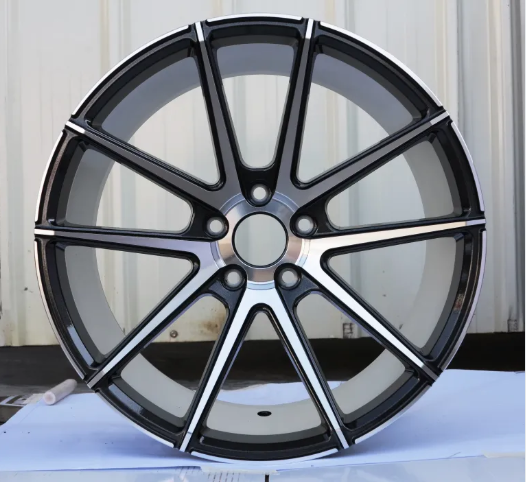Alloy wheels undoubtedly make your car stand out, boost its overall performance, and enhance the driving experience. However, these wheels are incredibly vulnerable to damage, scuffs, and scratches. The cost to repair alloy wheels can range from $50 to $300+ per wheel, with prices varying based on the extent and type of damage, wheel size and design, and the service provider. As a car owner, you may need to repair your alloy wheels at some point, depending on the extent and severity of the damage. Here's what you need to know about alloy wheel repair and how much it costs.
Understanding Alloy Wheels
First, you should have a basic understanding of alloy wheels. Unlike traditional steel wheels, alloy wheels are crafted with a mix of aluminum and other metals. These wheels have a unique appearance, are lighter, and offer better heat dissipation, making them ideal for producing high-performance cars. However, alloy wheels are relatively more expensive, and repairing them can be costly, depending on the type and extent of damage. Moreover, alloy wheels have a clear coat that prevents them from oxidizing and getting damaged. This clear coat can also get damaged, which makes them susceptible to corrosion, rust, and peeling. Different Types of Alloy Wheel Damage Before determining how much it costs to repair damaged alloy wheels, you need to understand the different types of alloy wheel damage. The severity of the damage will determine the alloy wheel scuff repair cost.
Some common types of alloy wheel damage include:
1. Cosmetic Damage Cosmetic damage is superficial and only affects the appearance of your car. It includes scratches, scuffs, fading of the clear coat, peeling, and corrosion. Cosmetic damage can usually be fixed with a simple repainting, polishing, or refinishing process.
2. Structural Damage Structural damage is more severe than cosmetic damage. It affects the physical structure of your alloy wheel, making it unsafe for use. Structural damage includes bends, cracks, and any other form of damage that affects the structural integrity of your wheel. In such cases, the wheel usually has to be replaced, which can be more expensive than the alloy wheel repair cost.
3. Potholes Damage Potholes can cause extensive damage to your alloy wheels, especially if you're driving at high speeds. Potholes can cause punctures, dents, cracks, and even dislodging of the wheel from its position. Potholes damage can range from cosmetic to structural, depending on the extent of the damage.
4. Curbside Damage Curbside damage is the most common type of alloy wheel damage. It occurs when your wheel rubs against the curb, leaving scuffs, scratches, and even dents on your wheel. Curbside damage is considered mild cosmetic damage and can be easily repaired using a paint touch-up kit.

How Much Does it Cost to Repair Alloy Wheels?
Now that you understand the different types of alloy wheel damage, you can estimate how much it costs to repair them.
1.Scratch and Scuff Repairs Minor scratches and scuffs can be easily fixed using a paint touch-up kit, DIY solutions, or a professional repaint. The cost depends on the severity of the damage. On average, you can expect to pay between $50 and $150 per wheel.
2. Refinishing If your alloy wheels have lost their luster and shine, you can consider refinishing them. Refinishing involves sanding off the old finish, repainting the wheel, and reapplying the clear coat. The cost of refinishing depends on the type and quality of paint used, the extent of the damage, and the size of your wheels. The cost of refinishing can range from $200 to $400 per wheel.
3. Curb Rash Repairs Curb rash is the most common type of alloy wheel damage and can be easily repaired. Curb rash repair involves removing any scratches on the wheel and filling in any dents or chips using specialized tools. The cost of alloy wheel repair can range from $75 to $150 per wheel.
4. Welding and Straightening If your alloy wheel experiences structural damage, it may require welding and straightening. This process involves heating the metal to its melting point, welding any cracks or dents, and reshaping the wheel to its original form. Welding and straightening costs depend on the severity of the damage and the size of the wheel. On average, you can expect to pay between $250 and $500 per wheel.
5. Replacement If your alloy wheel has severe structural damage, it may need to be replaced entirely. Wheel replacement costs depend on the make and model of your car, the size of the wheel, and the quality of the wheel you choose. On average, you can expect to pay between $150 and $600 per wheel.
Conclusion
In summary, repairing alloy wheels can be costly, depending on the type and extent of the damage. Cosmetic damage such as scuffs and scratches can be repaired using DIY solutions, paint touch-up kits, or a professional repaint. Structural damage may require professional welding and straightening, or in severe cases, wheel replacement. However, preventing alloy wheel damage is always the best approach. Regular maintenance, safe driving practices, and avoiding potholes and curbs can help keep your alloy wheels in top shape and extend their lifespan.